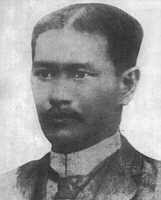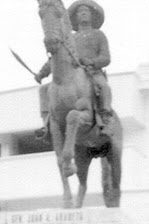THE IMPORTANCE TO RETAIN OUR VERY OWN LANGUAGE AND CULTURE
Agurang Dinggol,
Salamat, ti ari na gid ko ya.
Nindot ning ginsiling mo: "In short, I would still prefer to believe history handed down from generation to generation rather than from any Tom, Dick and Harry."
Mopati gid ko nimo nga:
1. "History"is handed down from generation to generation. On-going "history" is handed down from communities or families from one generation to the next.
2. Families or communities of Tom, Dick and Harry hand down their victor's version of history. On the other hand, the likes of 'Paguntalan' hand down their own version of history to their offsprings' generation and the next.
3. There are different interpretations of 'history'. Which 'history' do you prefer to believe? Which interpretations? Which re-interpretations?
4. The point is: 'history' as an interpretation depends on the interpreters. It depends on the parents, their offsprings and the next generation of families, how they understand and judge the experience being passed on from parents and ancestors. It depends on the 'integrity' or truthfulness of the interpreters. It depends on the authenticity of the interpreters(ancestors and offsprings, the historians), that is, depending on their level of attentiveness to experience and research, level of understanding of what actually happened, use of reason for right judgment, and level of responsibility and success on passing it on to the next generation.
And would it be received successfully, rightly and intelligently by the next generations, givent the records and stories?
5. Nevertheless, what is being interpreted are the facts or evidence of 'history' (or lack of it. ). Thus, 'history' as what actually happened is the answer of questions, such as what actually happened in such a place in such a time in such persons or community? True 'historians go beyond interpretations to get the right judgment of what actually happened with the use of reason and rationality. Previous interpretations are continuously disproven or reinterpreted in the light of new understanding given the discovery of the new data or evidence, until they get the right judgment on what actually happened, on the first place, in that place, in that moment of history.
6. Generally speaking, We, who should be (supposedly) attentive, intelligent, rational and responsible human beings do experience, understand, know and responsibly live in this constantly changing and historical world!
7. Lived history is ongoing. It has moments in the past and continuing moments of today in the lives of communities. Communites have common meanings and understandings of truths to be passed on for the following generations or communities who would successfully (or unsuccessfully) receive and pass them on. If one generation today die without passing them on, if the records and evidence are destoryed and lost, buried in time and oblivion, then their story or 'history is cut off, the previous chapters are lost, and the values and meanings that have to be passed on are not received by the next generation of 'witnesses' and interpreters and carriers of history. The lived story or history can't go on, can't move forward.
8. Like the story of Jesus too. If he had no disciples nor followers, then no one would have heared him, understood him, believed in his truth, and wrote or passed on his 'good news' . Thanks to the witnessing of the communities that continually pass on the story of Jesus through the retelling of his story in words and action, and specially in lived witness. Yet, even Jesus said 'blessed are those who believe even though they have not seen him'. Those who came to believe but have not seen him came to believe in the truth of Jesus through the living witness of his followers, disciples and believers through out history.
9. They came to believe in the light of faith. They came to believe through their own experience, understanding, judgment of the veracity of Jesus' story. They have been experiencing and living in faith and knowledge of his undying love and care for them concretized in the faithful witnessing communities and individual Christians. If there were no living witnesses nor scriptures nor traditions of Christian communities from the early history of early Christianity, the martyrs and church fathers, the mytics and monks, the religous and the laity through medieval times up to modern times, who believed Jesus' story, then it would would have been lost or ended in oblivion long time ago.
10. But the story does end or it could end if only one generation refuses to receive and pass it on, or preserve its records and traditions to be given and reinterpreted for the next generations.
11. Same story for the Ilonggo Nation Movement. It has a story, moments in the past and still on-going now in the reinterpreting and knowing of what actually happened. But it could end soon, if this generation fails to pass on or retell or reinterpret the story. It fails if one generation fails to faithfully live out the values and meanings that have been received from parents and communities.
12. In hope, may the young generation and the next understand and own the story, their history, their cultural values and received traditions. Hopefully, it will be received through the language or symbols or perspectives appropriate for Toto and Inday, easy to be deeply understood by the 'pakaisa' ug 'pakaduha', to be true to the Ilonggo people, true to their own perspective as a nation. You just wonder what people's vision, world view, meaning, joy, texture, sensitivities and sentiments and jokes and all the rest are gone or off, when the nation's language is diminished or gone extinct. Or not spoken anymore.
Ti, sayang gid. Namit tani ang tono kag pamatyag.
"kon di ka mapati sa akon ginasiling, ti, ikaw ang 'magsiling' ako ang mapati",
Agurang Akoy (INM- Shanghai, China)
Agurang Dinggol,
Salamat, ti ari na gid ko ya.
Nindot ning ginsiling mo: "In short, I would still prefer to believe history handed down from generation to generation rather than from any Tom, Dick and Harry."
Mopati gid ko nimo nga:
1. "History"is handed down from generation to generation. On-going "history" is handed down from communities or families from one generation to the next.
2. Families or communities of Tom, Dick and Harry hand down their victor's version of history. On the other hand, the likes of 'Paguntalan' hand down their own version of history to their offsprings' generation and the next.
3. There are different interpretations of 'history'. Which 'history' do you prefer to believe? Which interpretations? Which re-interpretations?
4. The point is: 'history' as an interpretation depends on the interpreters. It depends on the parents, their offsprings and the next generation of families, how they understand and judge the experience being passed on from parents and ancestors. It depends on the 'integrity' or truthfulness of the interpreters. It depends on the authenticity of the interpreters(ancestors and offsprings, the historians), that is, depending on their level of attentiveness to experience and research, level of understanding of what actually happened, use of reason for right judgment, and level of responsibility and success on passing it on to the next generation.
And would it be received successfully, rightly and intelligently by the next generations, givent the records and stories?
5. Nevertheless, what is being interpreted are the facts or evidence of 'history' (or lack of it. ). Thus, 'history' as what actually happened is the answer of questions, such as what actually happened in such a place in such a time in such persons or community? True 'historians go beyond interpretations to get the right judgment of what actually happened with the use of reason and rationality. Previous interpretations are continuously disproven or reinterpreted in the light of new understanding given the discovery of the new data or evidence, until they get the right judgment on what actually happened, on the first place, in that place, in that moment of history.
6. Generally speaking, We, who should be (supposedly) attentive, intelligent, rational and responsible human beings do experience, understand, know and responsibly live in this constantly changing and historical world!
7. Lived history is ongoing. It has moments in the past and continuing moments of today in the lives of communities. Communites have common meanings and understandings of truths to be passed on for the following generations or communities who would successfully (or unsuccessfully) receive and pass them on. If one generation today die without passing them on, if the records and evidence are destoryed and lost, buried in time and oblivion, then their story or 'history is cut off, the previous chapters are lost, and the values and meanings that have to be passed on are not received by the next generation of 'witnesses' and interpreters and carriers of history. The lived story or history can't go on, can't move forward.
8. Like the story of Jesus too. If he had no disciples nor followers, then no one would have heared him, understood him, believed in his truth, and wrote or passed on his 'good news' . Thanks to the witnessing of the communities that continually pass on the story of Jesus through the retelling of his story in words and action, and specially in lived witness. Yet, even Jesus said 'blessed are those who believe even though they have not seen him'. Those who came to believe but have not seen him came to believe in the truth of Jesus through the living witness of his followers, disciples and believers through out history.
9. They came to believe in the light of faith. They came to believe through their own experience, understanding, judgment of the veracity of Jesus' story. They have been experiencing and living in faith and knowledge of his undying love and care for them concretized in the faithful witnessing communities and individual Christians. If there were no living witnesses nor scriptures nor traditions of Christian communities from the early history of early Christianity, the martyrs and church fathers, the mytics and monks, the religous and the laity through medieval times up to modern times, who believed Jesus' story, then it would would have been lost or ended in oblivion long time ago.
10. But the story does end or it could end if only one generation refuses to receive and pass it on, or preserve its records and traditions to be given and reinterpreted for the next generations.
11. Same story for the Ilonggo Nation Movement. It has a story, moments in the past and still on-going now in the reinterpreting and knowing of what actually happened. But it could end soon, if this generation fails to pass on or retell or reinterpret the story. It fails if one generation fails to faithfully live out the values and meanings that have been received from parents and communities.
12. In hope, may the young generation and the next understand and own the story, their history, their cultural values and received traditions. Hopefully, it will be received through the language or symbols or perspectives appropriate for Toto and Inday, easy to be deeply understood by the 'pakaisa' ug 'pakaduha', to be true to the Ilonggo people, true to their own perspective as a nation. You just wonder what people's vision, world view, meaning, joy, texture, sensitivities and sentiments and jokes and all the rest are gone or off, when the nation's language is diminished or gone extinct. Or not spoken anymore.
Ti, sayang gid. Namit tani ang tono kag pamatyag.
"kon di ka mapati sa akon ginasiling, ti, ikaw ang 'magsiling' ako ang mapati",
Agurang Akoy (INM- Shanghai, China)


















No comments:
Post a Comment